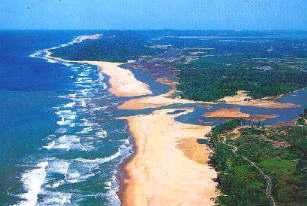Nekton
Nekton refers to the aggregate of actively swimming aquatic organisms in a body of water (usually oceans or lakes) able to move independently of water currents.
Nekton can be contrasted with plankton, which refers to the aggregate of passively floating, drifting, or somewhat motile organisms present in a body of water, primarily tiny algae and bacteria, small eggs and larvae of marine organisms, and protozoa and other minute consumers.
As a guideline, nekton are larger and tend to swim largely at biologically high Reynolds numbers (>10³ and up beyond 10⁹), where inertial flows are the rule, and eddies (vortices) are easily shed. Plankton, on the other hand, are small and, if they swim at all, do so at biologically low Reynolds numbers (0.001 to 10), where the viscous behavior of water dominates, and reversible flows are the rule. Organisms such as jellyfish and others are considered plankton when they are very small and swim at low Reynolds numbers, and considered nekton as they grow large enough to swim at high Reynolds numbers. Many animals considered classic examples of nekton (e.g., Mola mola, squid, marlin) start out life as tiny members of the plankton and gradually transition to nekton as they grow.
Oceanic nekton
Oceanic nekton comprises animals largely from three clades
- Vertebrates form the largest contribution, these animals are supported by either bones or cartilage.
- Mollusks are animals such as squids and scallops.
- Crustaceans are animals such as lobsters and crabs.
There are organisms whose initial part of their lives are spent as plankton but when they grow and increase in body size they become nekton. A typical example is the medusa of the jellyfish.
See also
- neuston (the organisms, typically microscopic, that float near the surface of the water)
- pleuston (all organisms that float near the surface of the water)
- plankton (the organisms that float and drift within the water)
- benthos (the organisms at the bottom of a body of water)
External links
- Stefan Nehring and Ute Albrecht (1997): „hell und das redundante Benthon: Neologismen in der deutschsprachigen Limnologie“. In: Lauterbornia H. 31: 17-30, Dinkelscherben, December 1997 E-Text (PDF-Datei)
![]() The dictionary definition of nekton at Wiktionary
The dictionary definition of nekton at Wiktionary

